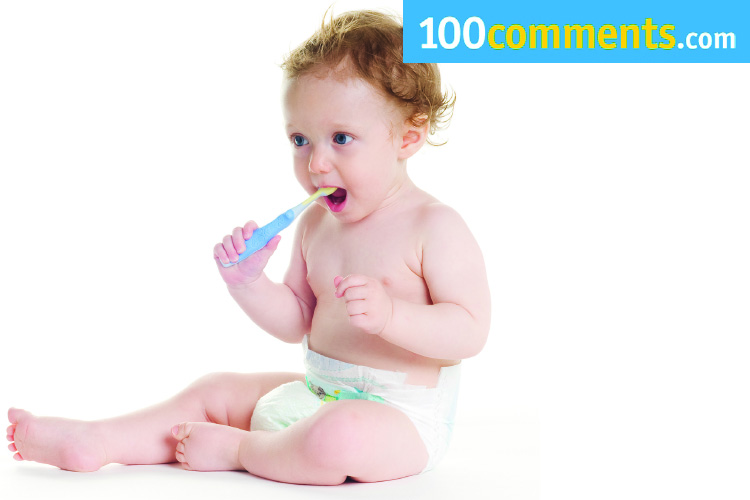Who can resist an adorable toothy smile from a baby? A baby’s first teeth must be the cutest sight ever to a parent! As your little one becomes a toddler and grows more teeth, starting him or her off with good dental care habits can help keep a healthy set of teeth for decades to come.
A baby’s milk teeth begin cutting through the gums around six months and they help set the stage for future smiles. Milk teeth also function as space keepers in the jaw while waiting for adult teeth to arrive. These teeth cannot be neglected just because they will eventually fall out. They should be as healthy as permanent teeth and should be similarly taken care of, albeit gently but thoroughly.
Table of Contents
Getting into the habit
Any kind of cleaning up seems torturous to most kids, and teeth-cleaning is no exception. The best way to get your toddler used to cleaning his or her teeth would be by making it into a daily routine, and this may call for some patience and persistence! You can gradually give the little one more responsibility for the brushing as time goes on, but you’ll still need to supervise. Persuasion is always better than force when it comes to forming good habits. Persuade your toddler into letting you help to brush his or her teeth regularly. If your little one is still reluctant, it may help to see you brush your teeth first. Letting your toddler choose his or her own toothbrush and toothpaste flavor may also help.
Here are some tried and tested tips that we hope will be useful to you:
- Clean your toddler’s teeth twice a day, including once before bed.
- Use a small toothbrush with soft, round-ended bristles of differing lengths, and a small, angled head.
- Use a smear of low-fluoride toothpaste for your toddler. (You may ask your doctor for recommendations).
- Brush using small, circular movements.
- Concentrate on one section of teeth at a time, and don’t forget the back. Make sure all traces of food on or in between those little teeth are brushed away.
- Encourage your toddler to spit out any excess toothpaste.
Ditch the Pacifier!
There are lots of good reasons to let your child use a pacifier, but in the long term it can affect how his teeth line up. It can also change the shape of the mouth.
Talk to your doctor if he’s still using a pacifier past the age of three.
Keeping little teeth healthy
A good diet will go a long way in helping build strong teeth in toddlers. A lot of the foods and drinks that keep your toddler in good general health are also good for your little one’s teeth, so be sure to offer your child a balanced diet with plenty of fruit and vegetables.
Calcium will help your toddler grow strong bones and teeth. Leafy green vegetables and soya are good sources of calcium. You should also make sure your toddler’s diet contains plenty of vitamin D, which will help that little body to absorb more calcium. Good sources of vitamin D include oily fish, fortified breakfast cereals, milk and eggs.
When it comes to sweet stuff, choose wisely
Firstly, try to restrict sugary food and drinks to mealtimes. Secondly, remember that a small slice of cake or pudding is less harmful to your toddler’s teeth than a lollipop that he gets to suck on for an hour!
A cheesy finish
After a sweet snack, give your little one a small piece of hard cheese to neutralise the leftover sugars in the mouth.
The Problem with sugary stuff
Sugar combines with the bacteria in the mouth to make a mild acid which attacks the hard outer layer of our teeth, making them vulnerable to decay and cavities. The more times a day your toddler eats something sugary, and the longer the sugar stays in the mouth, the more likely it is that damage will occur. Cleaning those little teeth after each meal and keeping sweets, cakes, chocolate and other high-sugar snacks to a minimum between meals will help minimize the risk of tooth decay. Instead, encourage healthy, tooth-friendly snacks, such as vegetable sticks, fruit and yogurt.
Visiting the dentist
Most first teeth have nearly a decade of hard work in front of them. Good oral care, which includes visits to a dentist, will lay the foundations for a lifetime of healthy teeth. Dentists can help to prevent, as well as cure teeth problems. So don’t wait until you see signs of tooth decay or until you think your toddler’s teeth needs help before taking your child to see a dentist. Also, taking your toddler to the dentist from a young age with help get the little one used to the environment of a dentist’s office. Taking your child to your own appointments will help too. Make the visits fun and positive, even if you aren’t a fan of the dentist yourself. Dentists have lots of experience at making children feel welcome and comfortable. They may even offer your toddler a little reward at the end of the appointment.
Fluoride strengthens tooth enamel and helps to resist decay. Some children are particularly prone to tooth decay, and dentists sometimes recommend fluoride supplements as well as fluoride toothpaste. Always ask your dentist for advice before giving your toddler fluoride supplements.
















